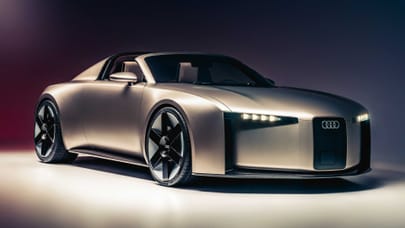
Here's how VW is responding to its big diesel emissions scandal
Paul Horrell gets the latest from VW brand chief Herbert Diess
VW's emissions scandal has pushed the Group into a financial loss for the three months ending September, the first quarterly loss for more than 15 years.
It wasn't lost sales that hit the finances. After all, the scandal erupted only at the very end of the period. The reason for the loss is that VW has set aside £4.8bn to cover recalls. But it admits the costs will be much greater: this provision has nothing included for possible fines or compensation claims by owners.
Yet the company still expects to make some profit over the full year, because the first half was so strong. VW has already said investment spending will be cut by £720m over the next few years.
Top Gear spent time listening to Herbert Diess, chief of the Volkswagen brand, at the Tokyo show this week. He says this £720m reduction is about spending less on factories and the like, not cutting the spend on new model development.
However, Group Chief Executive Matthias Mueller said, on announcement of the financial results, “We will review in detail our current portfolio of more than 300 models and examine the contribution that each one makes to our earnings.”
Sounds to us like the axe could be hanging over future low-volume high-tech projects in the manner of the XL1 and Veyron, as well as the endless multiplication of overlapping models from Audi and VW. Mueller also said the company has to become more open and accountable, with less of a top-down culture.
Most engines need only a software flash, says Diess
Diess told us the Group has figured out what it's going to do to fix all the defeat-device-fitted diesel cars in Europe. He says the company is working with the European authorities and he's confident all cars will be fixed by the end of 2016. Most engines need only a software flash, he says.
For most dealers, that's a huge feat. In the UK alone, it's 1.2 million vehicles. Or more than 1600 cars a day to be fixed by the UK dealer network, six days a week. So if you have a VW needing other work, you might be hard-pressed getting an appointment.
In the USA, says Diess, technical fixes for the almost 500,000 affected cars are also well advanced. But he conceded when pushed that some cars might need expensive, bulky new SCR catalysts. So VW has been considering buying back some cars from owners. But he would not be drawn on whether that would happen.
Top Gear
Newsletter
Thank you for subscribing to our newsletter. Look out for your regular round-up of news, reviews and offers in your inbox.
Get all the latest news, reviews and exclusives, direct to your inbox.
One industry analyst, Bernstein Research, says a buy-back programme might cost VW £4.5 billion. But if it stops disgruntled owners from suing the company it might be worthwhile.
Diess also wouldn't say how many people in the company are suspended, because a legal investigation is under way. But another company source said neither Wolfgang Hatz, chief engineer Porsche who was engine chief for the VW Group, nor Ulrich Hackenberg, Group chief engineer, are coming into work at the moment. This hasn't been officially confirmed by VW.
What about future diesel sales? Some have speculated that US buyers will turn against VW diesels so completely that the reintroduction of VW TDIs there is dead in the water. Diess said he doesn't think so, but, "the first priority is to fix problems for customers. Market share and everything else is really second."
But he also says VW petrol and petrol hybrids are doing well in the US, claiming "we have exceptionally good sales." Even diesels haven't collapsed in Europe, he says, although “we have a little reduction in the UK and some southern European countries."
He acknowledged that the defeat device in Europe is the basically same as in the US. "The software detects if the car is on the rolling road or not, and depending on that the mapping is different. But I must state, if you compare these cars that we have to re-fit [in Europe] to many competitors, they are similar. This hasn't been discussed much, but they are not worse emissions-wise for NOx," claims Diess.
So, asks Top Gear, why did you use a defeat device at all? Diess, who worked at BMW at the time the affected engines were being made, just shrugs.
Trending this week
- Car Review
BMW iX3








